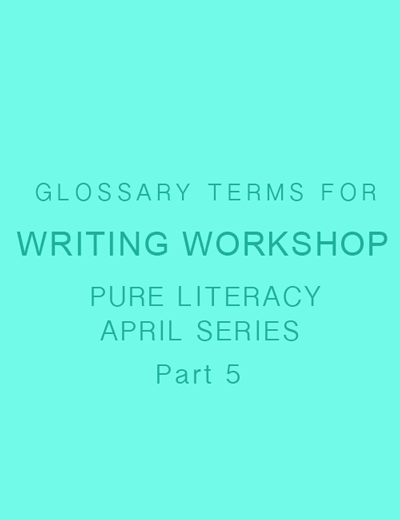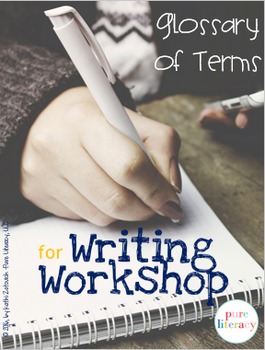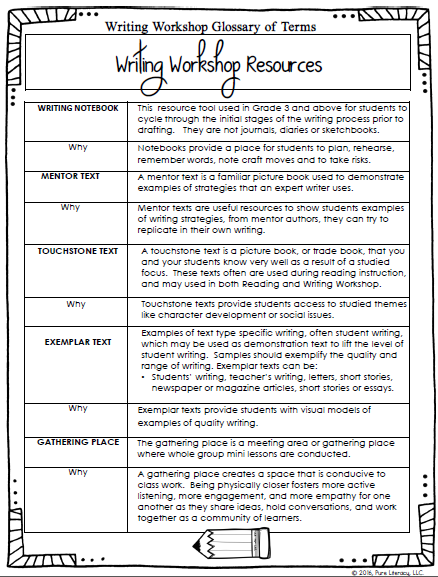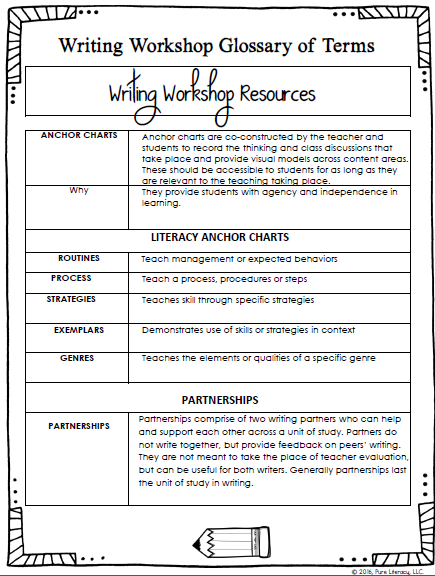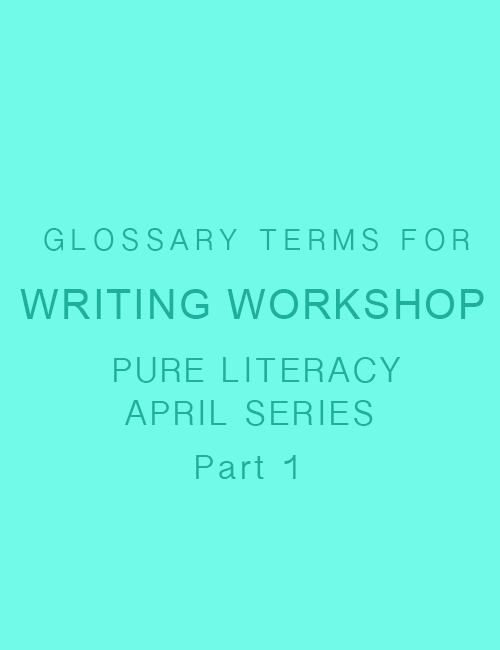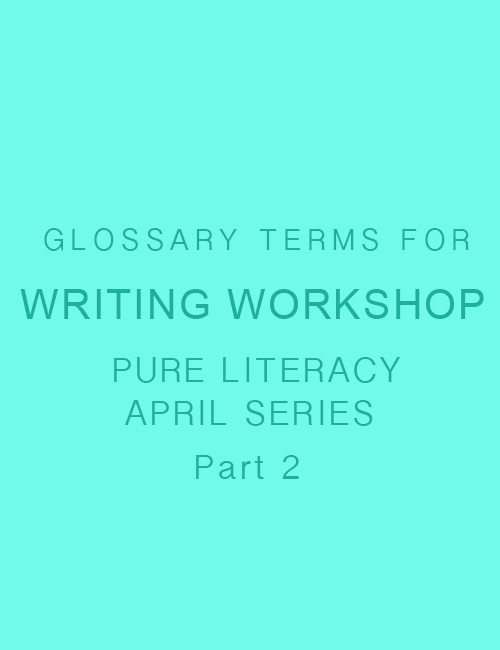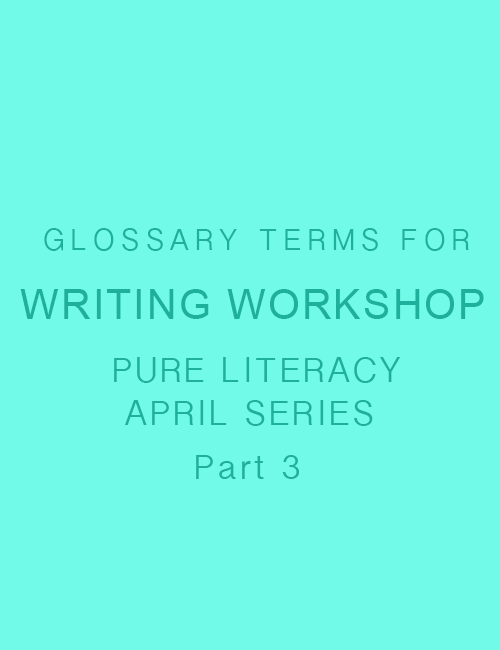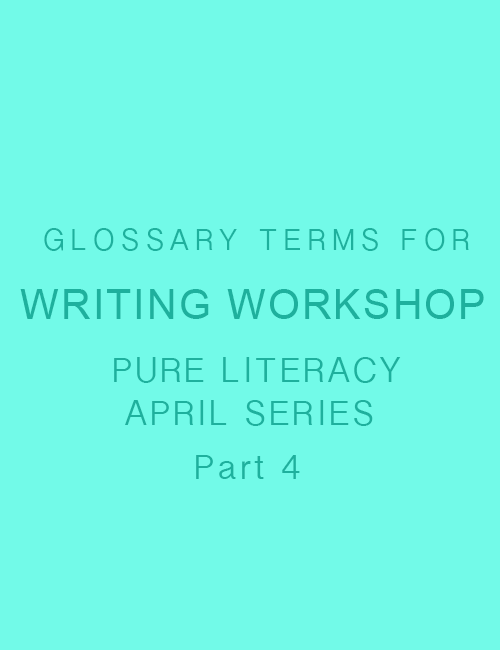Here it is, my fifth and final post for the Glossary of Writing Workshop Terms series! This post is more of a reflective on this series as a whole but as we come to the end I hope you have enjoyed the series and that it has helped untangle some of the commonly used terms associated with Writing Workshop.
I was inspired to craft this series after recently overhearing a young teacher say, “I’m just afraid of being made to look foolish. It’s like I don’t know if I have enough information about teaching writing to add to our group. I understand how to talk about how my students are performing emotionally and socially. I just don’t know how to talk about how they are performing academically in writing. I am not sure how to talk about what they need in the context of the workshop model. I wish I could talk to my colleagues, but many of them aren’t familiar with the workshop model either.”
This comment, made by a young teacher, is not unique. Many folks are feeling the same way as they navigate instructional shifts as demanded by the Common Core. I wanted for her, her colleagues, and all teachers ultimately, to understand that once I felt the same way, timid to participate in collegial discussions, not because I didn’t have something worthwhile to contribute, but because I didn’t have the confidence to add my voice to the collective discussion.
Once I sat at the back of the room hoping I would not have to talk, now I am the teacher leading the room. I remember how I struggled with learning the workshop model and especially the Lucy Calkins Units of Study writing curriculum implementing it in isolation. That’s right, I was the only teacher in my school, and district for that matter, that taught using the balanced literacy approach and the Lucy Calkins Units of Study writing curriculum for several years. I can remember being the only teacher on a district textbook selection committee suggesting not to endorse any of the proposed adoptions. Talk about isolation!
Initially after doing heaps of reading about Balanced Literacy, researching best practices and studying mentors like Fountas and Pinnell, Debbie Miller, and Lucy Calkins I came to believe strongly there had to be something better than a topic and textbook-driven instruction. I vividly remember struggling with implementing the Units of Study curriculum on my own in isolation. It was through that incredibly challenging, lonely implementation, I began to realize an amazing shift in student behavior and learning.
Sparked by giving my students more choice and voice in learning and by allowing them opportunities to choose their topics and being brave enough to make space and time for them to read independently student learning increased. And don't get me wrong, by independent reading I don't mean (NOT Drop Everything and Read-DEAR or silent sustained reading-SSR) but actually encouraging and supporting students to read self-chosen topics and supporting them with books at their independent reading level. And more importantly, by being brave enough to create time and space in the day for them to talk and write about what they read. By doing so, I witnessed amazing, rich conversations about what they were reading that far surpassed anything I could have even imagined or orchestrated, and were far more meaningful that any multiple choice, fill-in the blank questionnaire I would have provided through a workbook. Students were analyzing text, and critically thinking about the books they were reading supported by my providing explicit instruction analyzing text through questioning, inferring, predicting strategies. To my utter amazement students were transferring these higher level thinking strategies to their own independent reading books, and when I conferred with them I became even more committed and resolute in ensuring students had plenty of just-right reading texts in topics that captured their interest and plenty of time to talk and write about the books they were reading.
Equally important, by being brave and determined enough to create time and space in my instructional day for students to write each and every day of the week about topics that were personally meaningful, student writing began to equally astound me. Kids were vested in learning and on their way to being independent, inspired, self-regulated learners. Volume, stamina, vocabulary, fluency, and student engagement increased tenfold. By changing my practice, I witnessed a remarkable shift in my learners. Students who had more meaningful interactions with reading and writing were definitely more motivated to learn.
As an integral part of that change, and as I shared my interests, passions and vulnerabilities as a learner, we became a community of learners. Something magical happened. Behavior problems decreased and virtually began to disappear. Teaching this way, at many different grade levels, I literally watched students’ lives change in dramatic and lasting ways. In the several years that followed, changing grade levels from primary to intermediate and looping in between, all the while, using a balanced literacy model forever changed my approach to teaching and my beliefs about student learning. I became a foot soldier for responsive, joyful, authentic, workshop teaching.
Now hopefully, with this blog, I've created a place where you can join the discussion. I know many of you are involved in sweeping educational change. My vision is that the Pure Literacy community becomes a place where people can interact with literacy issues, ask questions, seek advice, puzzle and ponder together, share ideas that are meaningful and strategies that worked. My fondest hope is that by the support you receive you are no longer working in isolation or feeling like you have to face the challenges of implementation alone. That here you will feel supported and be inspired to find and share your teacher voice.
I encourage you to continue to share your opinions, experiences, questions, classroom conundrums and triumphs in the company of our Pure Literacy Community and would love you to submit your thoughtful questions to the Ask Anything section or share your comments to our community below. We all grow from continued interactions and support. And as we grow, so do our children.
In the spirit of growing, here are my questions for you:
- Was this series helpful?
- Do you want to see more of these types of series?
- Do you have a topic for another series you’d like me to delve into?
- Are there areas within this topic that I didn’t cover in the series that you’d like to know more about?
And last but not least, thank you so much for following along with this series!
Happy Reading!
Check out my freebie glossary, a combination of all the posts from this series rolled into one little lingo go-to! Available now at my TpT store!
Missed out on a few of the posts from this series? Check out earlier posts below:

